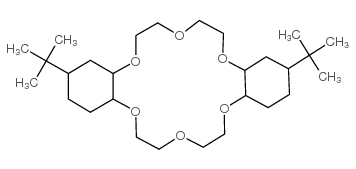28801-57-2
| Name | agn-pc-00gomh |
|---|---|
| Synonyms | MFCD00068562 |
| Density | 0.984g/cm3 |
|---|---|
| Boiling Point | 190-195ºC0.05 mm Hg(lit.) |
| Molecular Formula | C28H52O6 |
| Molecular Weight | 484.70900 |
| Flash Point | 207.871ºC |
| Exact Mass | 484.37600 |
| PSA | 55.38000 |
| LogP | 5.26640 |
| Vapour Pressure | 0mmHg at 25°C |
| Index of Refraction | n20/D 1.485 |
Synonym: Section 2 - COMPOSITION, INFORMATION ON INGREDIENTS
Risk Phrases: 23/24/25 36/37/38 Section 3 - HAZARDS IDENTIFICATION EMERGENCY OVERVIEW
Toxic by inhalation, in contact with skin and if swallowed. Irritating to eyes, respiratory system and skin.Hygroscopic (absorbs moisture from the air). Potential Health Effects Eye: Causes eye irritation. Skin: Causes skin irritation. Toxic in contact with skin. Ingestion: May cause irritation of the digestive tract. Poison by ingestion. Inhalation: Causes respiratory tract irritation. Toxic if inhaled. Chronic: Not available. Section 4 - FIRST AID MEASURES Eyes: Immediately flush eyes with plenty of water for at least 15 minutes, occasionally lifting the upper and lower eyelids. Get medical aid immediately. Skin: Get medical aid immediately. Immediately flush skin with plenty of water for at least 15 minutes while removing contaminated clothing and shoes. Ingestion: Get medical aid immediately. Wash mouth out with water. Inhalation: Get medical aid immediately. Remove from exposure and move to fresh air immediately. If not breathing, give artificial respiration. If breathing is difficult, give oxygen. Notes to Physician: Treat symptomatically and supportively. Section 5 - FIRE FIGHTING MEASURES General Information: As in any fire, wear a self-contained breathing apparatus in pressure-demand, MSHA/NIOSH (approved or equivalent), and full protective gear. Extinguishing Media: Use water spray, dry chemical, carbon dioxide, or chemical foam. Section 6 - ACCIDENTAL RELEASE MEASURES General Information: Use proper personal protective equipment as indicated in Section 8. Spills/Leaks: Absorb spill with inert material (e.g. vermiculite, sand or earth), then place in suitable container. Isolate area and deny entry. Section 7 - HANDLING and STORAGE Handling: Do not breathe dust, vapor, mist, or gas. Do not get in eyes, on skin, or on clothing. Use only in a chemical fume hood. Storage: Store in a cool, dry place. Store in a tightly closed container. Store under nitrogen. Section 8 - EXPOSURE CONTROLS, PERSONAL PROTECTION Engineering Controls: Facilities storing or utilizing this material should be equipped with an eyewash facility and a safety shower. Use adequate ventilation to keep airborne concentrations low. Exposure Limits CAS# 28801-57-2: Personal Protective Equipment Eyes: Not available. Skin: Wear appropriate protective gloves to prevent skin exposure. Clothing: Wear appropriate protective clothing to prevent skin exposure. Respirators: Follow the OSHA respirator regulations found in 29 CFR 1910.134 or European Standard EN 149. Use a NIOSH/MSHA or European Standard EN 149 approved respirator if exposure limits are exceeded or if irritation or other symptoms are experienced. Section 9 - PHYSICAL AND CHEMICAL PROPERTIES Physical State: Viscous liquid Color: clear colorless Odor: Not available. pH: Not available. Vapor Pressure: Not available. Viscosity: Not available. Boiling Point: 190 - 195 deg C @ 0.05 mmHg Freezing/Melting Point: Not available. Autoignition Temperature: Not available. Flash Point: Not available. Explosion Limits, lower: Not available. Explosion Limits, upper: Not available. Decomposition Temperature: Solubility in water: Specific Gravity/Density: Molecular Formula: C28H52O6 Molecular Weight: 484.72 Section 10 - STABILITY AND REACTIVITY Chemical Stability: Stable. Conditions to Avoid: Incompatible materials, exposure to moist air or water. Incompatibilities with Other Materials: Strong oxidizing agents, strong acids. Hazardous Decomposition Products: Carbon monoxide, carbon dioxide. Hazardous Polymerization: Will not occur. Section 11 - TOXICOLOGICAL INFORMATION RTECS#: CAS# 28801-57-2: HP5385300 LD50/LC50: Not available. Carcinogenicity: 4', 4" (5")-Di-tert. butyldicyclohexano-18-crown-6 - Not listed by ACGIH, IARC, or NTP. Other: See actual entry in RTECS for complete information. Section 12 - ECOLOGICAL INFORMATION Section 13 - DISPOSAL CONSIDERATIONS Dispose of in a manner consistent with federal, state, and local regulations. Section 14 - TRANSPORT INFORMATION IATA Shipping Name: Toxic liquid, organic, n.o.s.* Hazard Class: 6.1 UN Number: 2810 Packing Group: III IMO Shipping Name: Toxic liquid, organic, n.o.s. Hazard Class: 6.1 UN Number: 2810 Packing Group: III RID/ADR Not regulated as a hazardous material. Section 15 - REGULATORY INFORMATION European/International Regulations European Labeling in Accordance with EC Directives Hazard Symbols: T Risk Phrases: R 23/24/25 Toxic by inhalation, in contact with skin and if swallowed. R 36/37/38 Irritating to eyes, respiratory system and skin. Safety Phrases: S 26 In case of contact with eyes, rinse immediately with plenty of water and seek medical advice. S 28 After contact with skin, wash immediately with... S 36/37/39 Wear suitable protective clothing, gloves and eye/face protection. S 38 In case of insufficient ventilation, wear suitable respiratory equipment. S 45 In case of accident or if you feel unwell, seek medical advice immediately (show the label where possible). WGK (Water Danger/Protection) CAS# 28801-57-2: No information available. Canada None of the chemicals in this product are listed on the DSL/NDSL list. CAS# 28801-57-2 is not listed on Canada's Ingredient Disclosure List. US FEDERAL TSCA CAS# 28801-57-2 is not listed on the TSCA inventory. It is for research and development use only. SECTION 16 - ADDITIONAL INFORMATION N/A |
CHEMICAL IDENTIFICATION
HEALTH HAZARD DATAACUTE TOXICITY DATA
|
| Hazard Codes | T |
|---|---|
| Risk Phrases | R23/24/25;R36/37/38 |
| Safety Phrases | S26-S28-S36/37/39-S38-S45 |
| RIDADR | UN 2811 6.1/PG 3 |
| WGK Germany | 3 |
| RTECS | HP5385300 |
